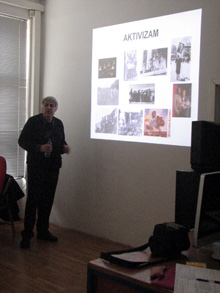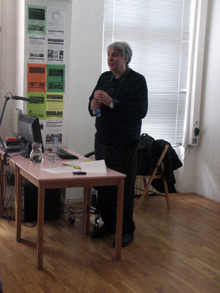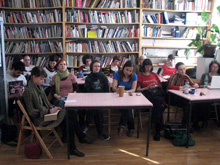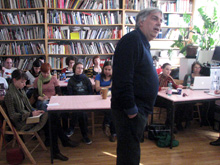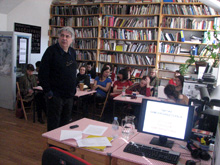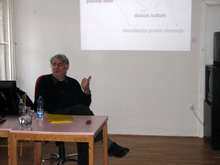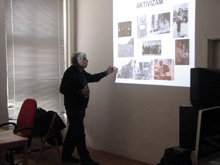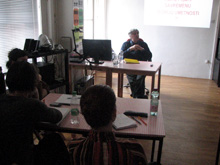WORLD OF ART
School for Curators and Critics of Contemporary Art
Season 14
1st Year (November 2011–June 2012)
Workshop on writing about contemporary art
Friday, March 23, 2012, from 10.00–18.30
Project Room SCCA, Metelkova 6, Ljubljana
Participants: Anja Bajda, Majda Gregorič, Marta Kiš, Neža Mrevlje, Vid Lenard, Nina Roškar, Maša Škrinjar, Igor Vidmar and participants of the 14th year of World of Art.
I will talk about the relationship between art and politics in contemporary culture and society. My intention is to show how it can be theoretized contemporary art and politics from the perspective of cultural and biopolitical theories. Contemporary relations between art and politics may be identified as a field of obsessions and phantasms about representing the ”truth of the world/life”, or, alternatively, as a field of obsessions and phantasms about performing the ”regulation of world/life”. When one crosses from the field of the ”politics of seeing”, i.e. spectacularisation into the field of discussing specific formations in the history of art, one may establish the following descriptive model:
- in the avant-gardes (ranging from futurism to surrealism through constructivism), spectacularisation was projected by means of utopian ideas about realizing the revolutionary-new in the industrial society – it concerned progress, speed, and turning from individual to mass consumption,
- in the neo-avant-gardes (neo-constructivism, kinetic art, eco-art, robotics in art), spectacularisation was realized by deriving a concrete utopia of a synthesis between science and art, by means of laboratory research conducted by artists and groups of artists modeled after scientific research teams,
- the spectacularisation of postmodern culture, the one between high and popular culture, was performed by means of a totalizing and eclectic mass consumer culture (nomadic pop, mimesis of mimesis, neo-expressionism, neo-conceptualism) in relation to the ideological suggestions of depoliticizing politics with regard to the postmodern meta-languages of power – science, technology, politics, and art are shown as cultural categories of consumption, and
- the spectacularisation of transition and globalism is based on an economically motivated expansion of the scientific and technological infrastructures into the field of ”abstract knowledge” as a source of the production of affective situations in the field of art and culture (activist art, critical art, political art, bio art, internet art, cyberart, digital art, new performance art).
Artistic acting within these practices switches from exploring aesthetics and poetics to a politics of affect, which means publicly confronting the potentialities of regulating and deregulating forms of life. Acting in public has essentially changed. It occurs simultaneously in entirely incommensurable regimes, from that of the traditional public (to be, to speak, and to act in the street, among people), to the indeterminate mass-cultural modes of bourgeois-society ”public opinion”, through the media hybridity and incomparability of contemporary everzday culture.
My task is to show how we could write ”new theory” for ”new time”.
The workshop will be in Serbian language.
Timetable
Friday, March 23, 2012
10.00–11.30: Contemporary art
12.00–13.30: The right on theory (theory, philosophy and resistance in arts)
15.00–16.30: Tactics of self organization (activism, terrorism and self education in art)
17.00–18.30: How to write contemporary theory?
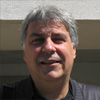 Miško Šuvaković (1954)
Miško Šuvaković (1954)
Miško Šuvaković was born in 1954 in Belgrade (Serbia). He holds a PhD from the Faculty of Fine Arts, University of Arts in Belgrade since 1993. Full professor at the Faculty of Music, University of Arts in Belgrade, where he additionally teaches art theory at the Interdisciplinary postgraduate program. Formerly a member of the conceptual art group Grupa 143 (1975–80) and informal theoretical community Zajednica za istraživanje prostora – ZzIP [Space research community – ZzIP] (1982–89). Editor of the independent journal Mentalni prostor [Mental space] (Belgrade, 1982–87). Member of the editorial board for the journals Transkatalog (Novi Sad, 1995–1998) and Teorija koja Hoda [Walking theory] (Belgrade, since 2001). Honorary member of the Slovenian Society of Aesthetics. His books include Scene jezika [Scenes of language] (Belgrade, 1989), Pas Tout (Buffalo, 1994), Prolegomena za analitičku estetiku [Prolegomena for analytical aesthetics] (Novi Sad, 1995), Postmoderna [Postmodernism] (Belgrade, 1995), Asimetrični drugi [The asymmetrical other] (Novi Sad, 1996), Estetika apstraktnog slikarstva [Aesthetics of abstract painting] (Belgrade, 1998), Pojmovnik moderne i postmoderne likovne umetnosti i teorije posle 1950 [Glossary of modern and post-modern visual arts and theory after 1950] (Belgrade and Novi Sad, 1999), Paragrami tela/figure [Paragrams of body/figure] (Belgrade, 2001), Anatomija angelova [Anatomy of angels] (Ljubljana, 2001), Figura, askeza in perverzija [Figure, asceticism and perversion] (Koper, 2001), Martek – Fatalne figure umjetnika: Eseji o umjetnosti i kulturi XX stoljeća u Jugoistočnoj, Istočnoj i Srednjoj Europi kroz djelovanje umjetnika Vlade Marteka [Martek – Fatal figures of the artist: essays on 20th-century art and culture in South-Eastern, Eastern and Central Europe through the work of Vlado Martek] (Zagreb, 2002), Impossible Histories – Historical Avant-gardes, Neo-avant-gardes, and Post-avant-gardes in Yugoslavia, 1918–1991 (Cambridge Mass, 2003), Politike slikarstva [The politics of painting] (Koper, 2004), Pojmovnik suvremene umjetnosti [Glossary of contemporary art] (Zagreb and Ghent, 2005), Konceptualna umetnost [Conceptual art] (Novi Sad, 2007), Epistemology of Art (Belgrade, 2008) etc. He has curated more than 20 exhibitions since 1978. Artistic Director of the Museum of Contemporary Art Vojvodina in Novi Sad, 2009–2010.
How to apply?
Send the electronic application form to our e-mail: svetumetnosti@scca-ljubljana.si or by post to SCCA-Ljubljana, Metelkova 6, 1000 Ljubljana.
The price of the workshop is for individuals 20 € eur and for institutions 30 € (with DDV). The copy of paid receipt is a precondition for participation in the workshop.
The number of available places is limited to 10 participants. We will accept applications till these paces are filled!
Application deadline: 19. 3. 2012
Contact:
SCCA-Ljubljana (office hours: 9.00–13.00)
Contact persons: Simona Žvanut in Saša Nabergoj
Metelkova 6, 1000 Ljubljana
Phone: (01) 431 83 85
e-mail: svetumetnosti@scca-ljubljana.si
Photos from the lecture:
